

LIBRARY 2.0: THE 21ST CENTURY WEB BASED LIBRARY SERVICES. Going Digital: An issue paper from the Networked Services Policy Taskgroup. By Neil Beagrie, Joint Information Systems Committee (JISC), on behalf of EARL, The Library Association and UKOLN An issue paper from the Networked Services Policy Taskgroup Series Editor: Sarah Ormes, UKOLN Introduction As public libraries develop the People’s Network and respond to funding calls to create digital content, senior managers increasingly need to address policy issues related to digitisation and the management of electronic content and services [1].
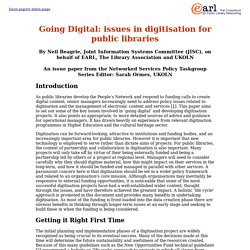
This paper aims to set out some of the key issues involved in ‘going digital’ and developing digitisation projects. It also points as appropriate, to more detailed sources of advice and guidance for operational managers. Digitisation can be forward-looking, attractive to institutions and funding bodies, and an increasingly important area for public libraries. Getting it Right First Time The initial planning and implementation phases of a digitisation project are widely recognised as being crucial to its eventual success. Training. Planning for Digitization. The Impact of Digitization on Special collection in Libraries. Library Catalog Digitization. Digital library and its different aspect.
Digital library and its different aspect Abstract[edit] Information and Communication Technology has revolutionized the concept of libraries.
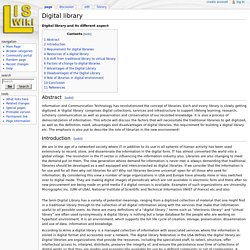
Each and every library is slowly getting digitized. A 'digital library' comprises digital collections, services and infrastructure to support lifelong learning, research, scholarly communication as well as preservation and conservation of our recorded knowledge. It is also a process of democratization of information. Introduction[edit] We are in the age of a networked society where IT in addition to its use in all spheres of human activity has been used extensively to record, store, and disseminate the information in the digital form. The term Digital Library has a variety of potential meanings, ranging from a digitized collection of material that one might find in a traditional library through to the collection of all digital information along with the services that make that information useful to all possible users.
Library digitization projects, issues and guidelines. Digitization of Library Materials in Academic Libraries: Issues and Challenges. Digitization and Digital Preservation. Library Services in the Digital Age. Released: January 22, 2013 By Kathryn Zickuhr, Lee Rainie and Kristen Purcell The internet has already had a major impact on how people find and access information, and now the rising popularity of e-books is helping transform Americans’ reading habits.
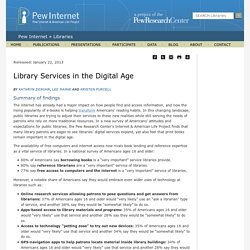
In this changing landscape, public libraries are trying to adjust their services to these new realities while still serving the needs of patrons who rely on more traditional resources. In a new survey of Americans’ attitudes and expectations for public libraries, the Pew Research Center’s Internet & American Life Project finds that many library patrons are eager to see libraries’ digital services expand, yet also feel that print books remain important in the digital age. The availability of free computers and internet access now rivals book lending and reference expertise as a vital service of libraries. Moreover, a notable share of Americans say they would embrace even wider uses of technology at libraries such as: DIGITIZATION OF LIBRARY: SERVICES, CHALLENGES AND PRESERVATION OF DIGITIZED INFORMATION. The Next Step in Librarianship: Is The Traditional Library Dead? L.A. Ogunsola. Library Philosophy and Practice 2011 L.A.
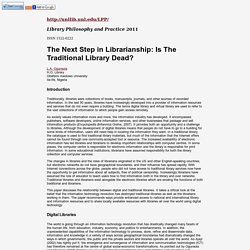
Ogunsola H.O. Library Obafemi Awolowo University Ile-Ife, Nigeria Introduction Traditionally, libraries were collections of books, manuscripts, journals, and other sources of recorded information. As society values information more and more, the information industry has developed. The changes in libraries and the roles of librarians originated in the US and other English-speaking countries, but electronic networks do not have geographical boundaries; and their influence has spread rapidly.
This paper discusses the relationship between digital and traditional libraries. Digital Libraries The world is going through an information technology revolution that has drastically changed many facets of the human life, from education, industry, economy, and politics to entertainments. Libraries in the Internet Age (Free Version) Five Challenges Every Librarian Must Face.
The dramatic changes in society, exponential advances in technology and globalization of ‘everything’ are easily recognizable one decade into the 21st Century.
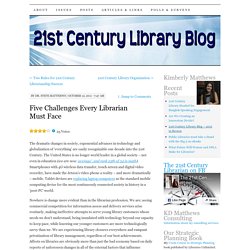
The United States is no longer world leader in a global society – not even in education (we are now ‘average’, and rank 25th of 34 in math). Smartphones with 4G wireless data transfer, touch screen and digital video recorder, have made the Jetson’s video phone a reality – and more dramatically – mobile. Tablet devices are replacing laptop computers as the standard mobile computing device for the most continuously connected society in history in a ‘post-PC’ world. Nowhere is change more evident than in the librarian profession. There are at least five major challenges that every librarian will face, sooner or later. 1. 2. The role of librarian as expert researcher handing information to a waiting patron is the antithesis to the collaborative, participative mindset of the emerging Millennial customer. 3. 4. 5. Like this: How and Why Are Libraries Changing? How and Why Are Libraries Changing?
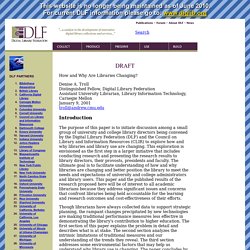
Denise A. Troll Distinguished Fellow, Digital Library Federation Assistant University Librarian, Library Information Technology, Carnegie Mellon January 9, 2001troll@andrew.cmu.edu Introduction.